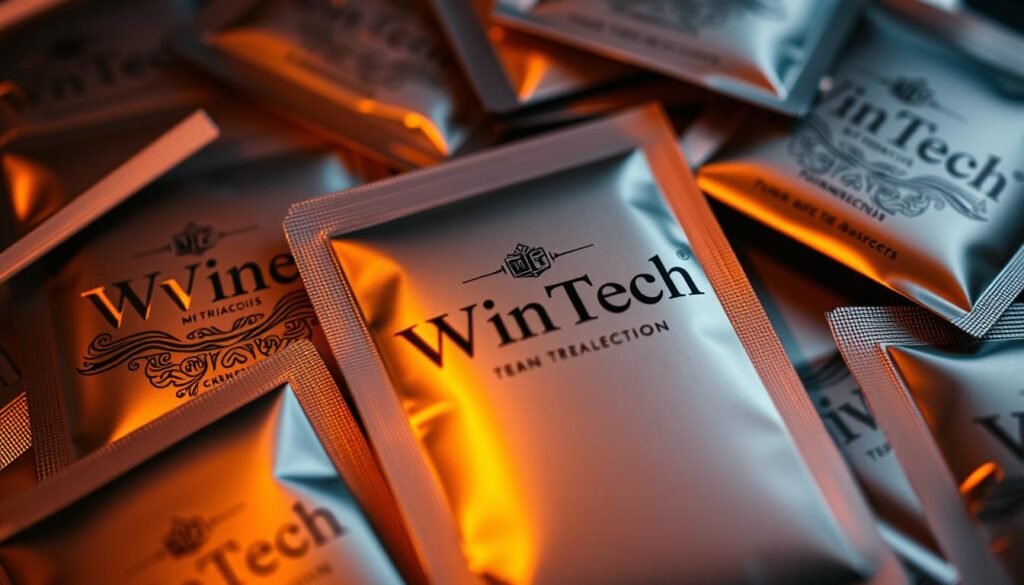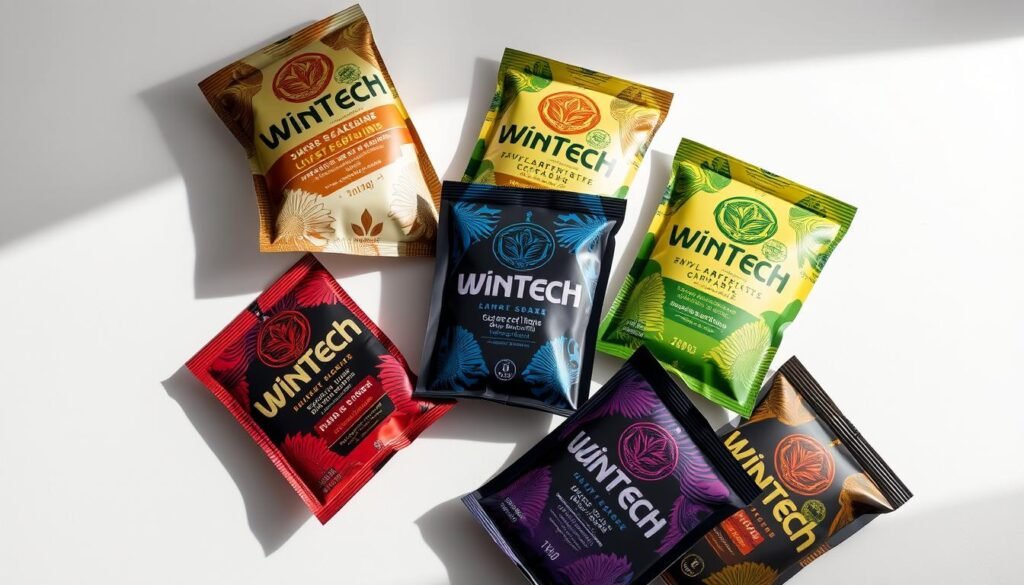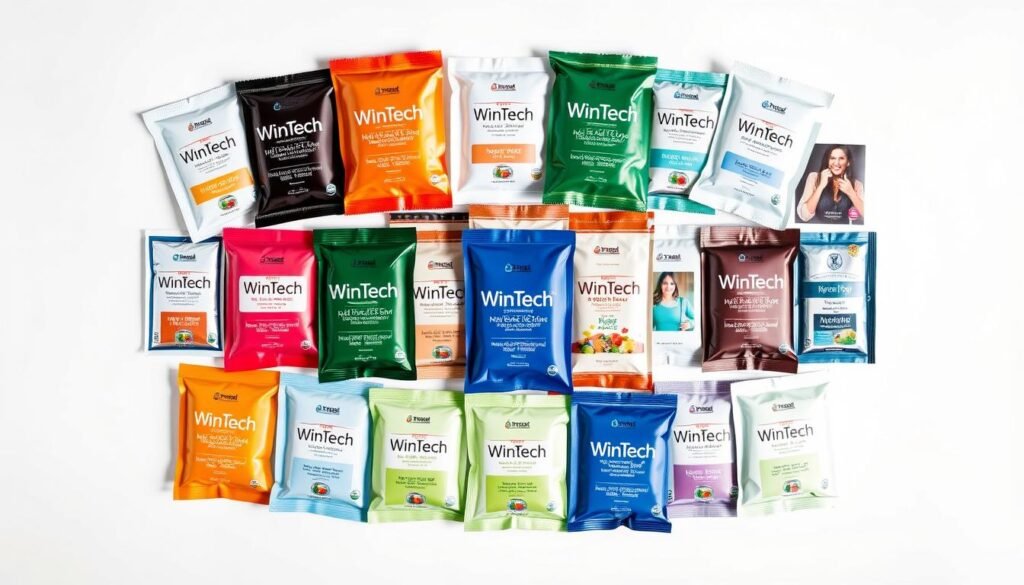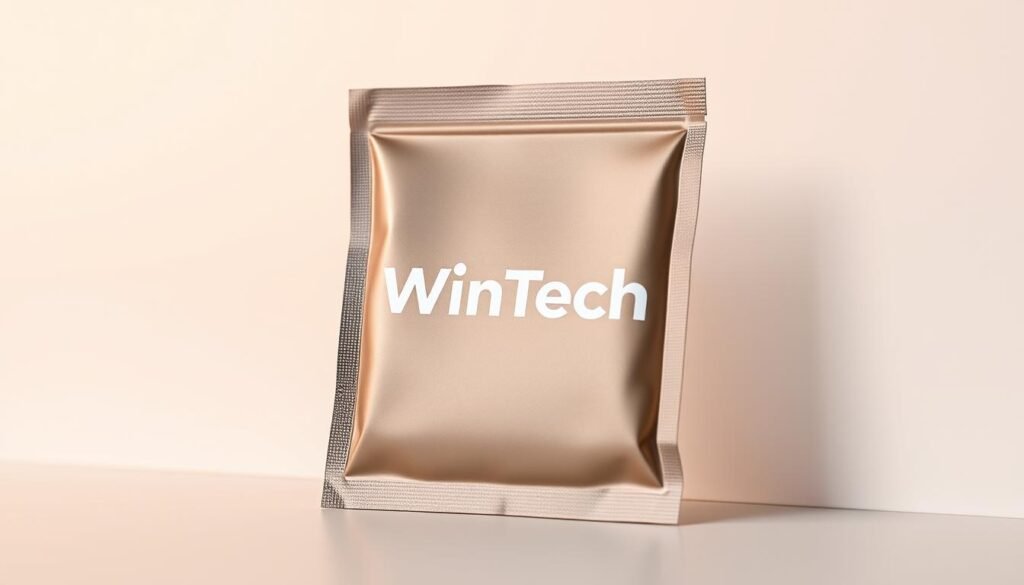Are you aware of the packaging solution that’s revolutionizing the way products are presented and consumed? You’re likely familiar with sachets, but do you know What Are Sachets and their full potential in brand enhancement?
What Are Sachets? Sachets are small bags or packets containing a single serving of a product, have been used across various industries, from food and cosmetics to pharmaceuticals. Their versatility in packaging and marketing makes them an attractive option for businesses looking to enhance their brand’s appeal.
By utilizing custom designs for sachets, companies can create a unique and memorable brand identity. This not only captures consumer attention but also differentiates their products in a crowded market.
Key Takeaways of What Are Sachets
- Understanding What Are Sachets and the definition and uses of sachets is crucial for effective brand enhancement.
- Sachets offer a versatile packaging solution for various industries.
- Custom designs for sachets can significantly enhance brand identity.
- Sachets are a cost-effective way to package and promote products.
- They provide a convenient and portable packaging option for consumers.
What Are Sachets: An Overview of Their Functionality
What Are Sachets In the world of packaging, sachets offer a versatile and efficient solution. Sachets are small bags or packets used to contain a single serving or application of a product. They are widely used across various industries, including food, cosmetics, and pharmaceuticals, due to their convenience and cost-effectiveness.

What Are Sachets – The Purpose of Sachets in Packaging
Sachets serve multiple purposes in packaging. They are designed to provide a precise amount of product, reducing waste and enhancing user experience. By packaging products in sachets, manufacturers can ensure that consumers use the exact amount required, thereby improving product efficacy.
Sachets also play a crucial role in product sampling and marketing. They allow consumers to try products without committing to a full-size purchase, which can be particularly effective in promoting new products or product lines.
Different Types of Sachets
Sachets come in various shapes, sizes, and materials, catering to different product requirements. The most common types include flat sachets, pillow sachets, and shaped sachets. Each type has its unique advantages and is suited for specific applications.
- Flat sachets are ideal for products that require a compact packaging solution.
- Pillow sachets offer more volume and are often used for products like coffee or tea.
- Shaped sachets can be designed to fit specific product contours, enhancing presentation.
Key Benefits of Using Sachets
The use of sachets in packaging offers several key benefits. They are cost-effective, as they allow for the packaging of small product quantities, reducing material costs. Sachets are also convenient for consumers, as they provide single-serve portions that are easy to use on-the-go.
Additionally, sachets can enhance product freshness by sealing out air and moisture, thereby extending shelf life. Their versatility in design and material also makes them suitable for a wide range of products, from food and beverages to cosmetics and pharmaceuticals.
What Are Sachets: Their Impact on Brand Awareness
The strategic use of sachets can elevate your brand’s visibility and appeal to consumers. Sachets are small, portable packets that contain a single serving or application of a product, making them a convenient and attractive packaging solution.
Enhancing Product Presentation
Sachets enhance product presentation by providing a compact, visually appealing way to package products. They are available in various types, including flat sachets, pillow sachets, and shaped sachets, allowing businesses to choose the most suitable option for their product.
For instance, cosmetic companies often use sachets to package samples of creams or lotions, allowing potential customers to try products without committing to a full-size purchase. This not only enhances product presentation but also serves as a marketing strategy to attract new customers.

Designing for Maximum Brand Recognition
Designing sachets for maximum brand recognition involves considering several key elements, including the material used, the color scheme, and the overall design. By carefully selecting these elements, businesses can create sachets that stand out on store shelves and reinforce their brand identity.
A well-designed sachet can communicate a brand’s values and aesthetic, making it more memorable to consumers. For example, eco-friendly brands may opt for biodegradable materials for their sachets, aligning with their brand values and appealing to environmentally conscious consumers.
| Design Element | Importance | Example |
|---|---|---|
| Material | Durability and eco-friendliness | Biodegradable plastics |
| Color Scheme | Brand recognition and appeal | Bright colors for youth-oriented brands |
| Graphics and Logos | Visual identity and brand recall | Prominent logo display |
The Role of Sachets in Marketing Strategies
Sachets play a significant role in marketing strategies by providing a versatile and cost-effective way to promote products. They can be used for product sampling, promotional campaigns, and as a means to introduce new products to the market.
By incorporating sachets into their marketing strategies, businesses can increase brand awareness, drive sales, and gather valuable consumer feedback. For example, offering free sachets at events or with purchases can encourage consumers to try new products, fostering brand loyalty.
What Are Sachets: Best Practices for Customization
When it comes to customizing sachets, there are several best practices to keep in mind to ensure your product stands out. Custom sachets can significantly enhance your brand’s image and product appeal. To achieve this, you need to consider various factors, from design elements to the materials used in production.
Elements to Consider in Sachet Design
Designing effective sachets involves more than just choosing the right size and shape. You should also consider the visual appeal, including colors, graphics, and typography. A well-designed sachet can capture consumers’ attention and differentiate your product from competitors.
- Choose colors that align with your brand identity.
- Use clear and legible typography to communicate product information.
- Incorporate graphics that enhance the product’s appeal.
Materials Used in Sachet Production
The materials used for sachets can vary widely, including paper, plastic, and fabric. Each material has its advantages and is suited to different types of products. For instance, foil sachets are often used for packaging sensitive products like coffee or pharmaceuticals because they provide a strong barrier against moisture and light.
| Material | Advantages | Common Uses |
|---|---|---|
| Paper | Eco-friendly, printable | Tea, spices |
| Plastic | Flexible, durable | Cosmetics, sauces |
| Foil | Barrier properties, preserves freshness | Coffee, pharmaceuticals |
Sustainability in Sachet Manufacturing
Sustainability is becoming increasingly important in packaging. When it comes to sachets, you can opt for eco-friendly materials or designs that minimize waste. Biodegradable sachets made from plant-based materials are a growing trend in sustainable packaging.

By considering these best practices for customizing sachets, you can create packaging that not only protects your product but also enhances your brand’s image and appeal to consumers.
What Are Sachets: Case Studies of Successful Use
You’ve seen how sachets can enhance product presentation and increase brand awareness. Now, let’s examine some real-world examples of brands that have successfully utilized sachets to boost their sales and marketing efforts.
Successful Brand Examples
Several well-known brands have leveraged sachets to great effect. For instance, cosmetic companies have used sachets to package sample products, allowing customers to try before they buy. Food manufacturers have also used sachets to distribute single-serving portions of spices or seasonings. These sachet examples demonstrate the versatility of sachets in various industries.
Impact on Sales
By analyzing the impact of custom sachets on sales, it becomes clear that they offer numerous benefits of sachets, including increased customer engagement and reduced packaging waste. Brands that have adopted sachet packaging have seen a significant boost in sales, as sachets provide a convenient and portable way to experience their products.
So, what are sachets? They are a powerful marketing tool that can drive sales, enhance brand recognition, and provide a unique customer experience. By understanding the successful use of sachets, you can unlock new opportunities for your brand.

